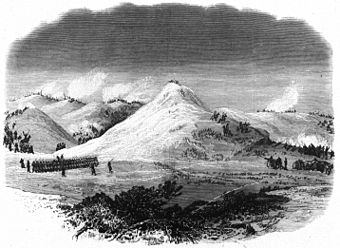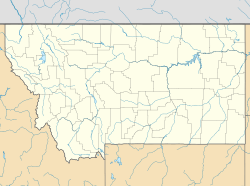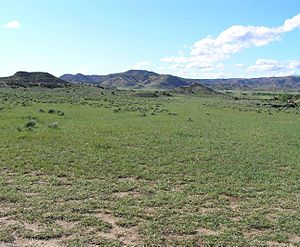Wolf Mountains Battlefield facts for kids
|
Wolf Mountains Battlefield-Where Big Crow walked Back and Forth
|
|

c. 1877 engraved depiction of the battle
|
|
| Nearest city | Birney, Montana |
|---|---|
| Area | 2,756 acres (1,115 ha) |
| Built | 1877 |
| NRHP reference No. | 00001617 |
Quick facts for kids Significant dates |
|
| Added to NRHP | January 10, 2001 |
| Designated NHLD | October 6, 2008 |
The Wolf Mountains Battlefield/Where Big Crow Walked Back and Forth is a very important historical site. It was here that the Battle of Wolf Mountain took place. This battle was the last major fight of the Great Sioux War of 1876–77.
This special place was added to the National Register of Historic Places in 2001. Later, in 2008, it was named a National Historic Landmark. This means it is recognized as a place of great importance to the history of the United States.
Contents
The Great Sioux War and Its End
The Great Sioux War happened because settlers and gold miners wanted land that had been promised to the Sioux people by treaties. Both sides sometimes broke these agreements. Earlier in the war, there were big battles like the Battle of Rosebud. The Native American tribes also won a major victory at Little Bighorn on June 25, 1876.
However, it was hard for the tribes to keep fighting for a long time. They struggled to gather enough food to last through the cold winter months. This made it difficult to continue the war.
The Battle of Wolf Mountains
The Battle of Wolf Mountains happened on January 8, 1877. The day before, on January 7, soldiers set up a camp west of the river. Their camp was protected by tall cliffs.
During the battle, Crazy Horse and his Oglala band, along with Lakota and Cheyenne warriors, held a strong position. They were on top of a canyon wall on the east side of the river. From there, they could fire down on the soldiers. But the soldiers eventually managed to push them back from this spot.
Both sides had people who were hurt or died in the battle. Big Crow, a Cheyenne medicine man, was among those who died here. The battle, along with the very cold weather and lack of food, made the tribal groups very weak. Because of this, Crazy Horse and his men surrendered on May 6, 1877. This surrender brought an end to the conflict.
A Glimpse of the Past
You can still see a rifle pit at the battlefield today. It was built by soldiers from F Company, Twenty-second Infantry, on January 9, 1877. This rifle pit is the only remaining structure from the battle on the site.
Protecting the Battlefield
The Wolf Mountains Battlefield is located in the Tongue River Valley, near Birney, Montana. The Tongue River flows through the area, making many curves. Within the National Historic Landmark area, the river sometimes runs through flat floodplains and sometimes next to tall rock walls.
The battlefield stretches for about two miles along the river. It is also about two-and-a-half miles wide across the valley. Besides the river, smaller streams also flow through the area. Even with some modern changes like unpaved roads and power lines, the battlefield still looks much like it did during the time of the battle.
Why the Battlefield is Important to Protect
The battlefield was added to the National Register of Historic Places in 2001. It was officially named a National Historic Landmark on October 7, 2008.
There are concerns that new developments, like coal bed methane production, could threaten this historic site. In 2006, a report from the Northern Cheyenne Nation talked about the importance of protecting such places. They wanted to make sure people knew about the possible dangers to historic and cultural sites like the Wolf Mountains Battlefield. They also wanted to highlight how important these battlefields are, just like the Little Bighorn Battlefield.
 | Madam C. J. Walker |
 | Janet Emerson Bashen |
 | Annie Turnbo Malone |
 | Maggie L. Walker |




